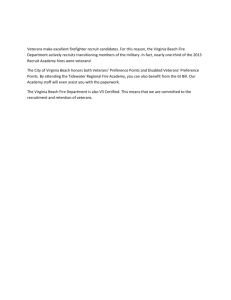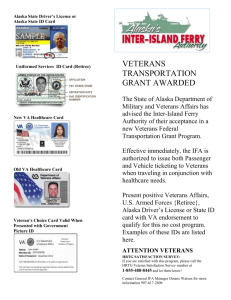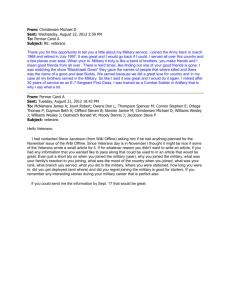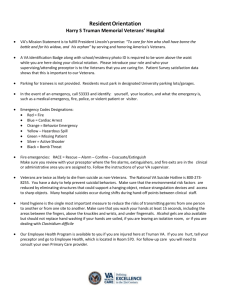108 - American Bar Association
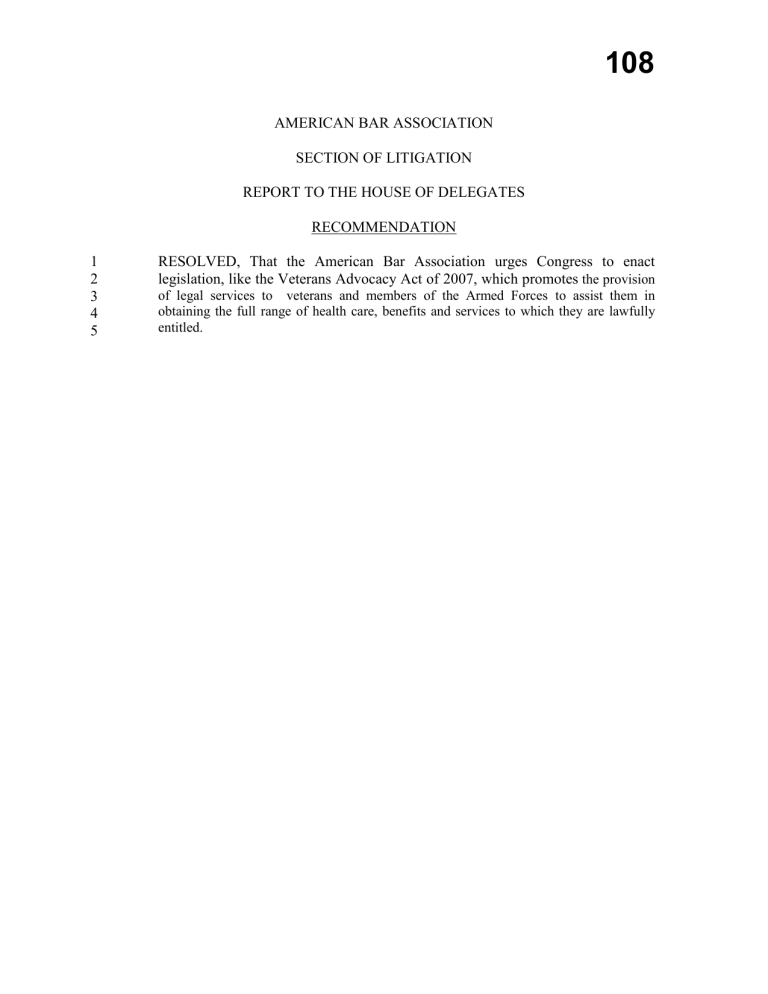
5
1
2
3
4
108
AMERICAN BAR ASSOCIATION
SECTION OF LITIGATION
REPORT TO THE HOUSE OF DELEGATES
RECOMMENDATION
RESOLVED, That the American Bar Association urges Congress to enact legislation, like the Veterans Advocacy Act of 2007, which promotes the provision of legal services to veterans and members of the Armed Forces to assist them in obtaining the full range of health care, benefits and services to which they are lawfully entitled.
108
R
EPORT
Presently, members of our Armed Forces are returning from overseas conflicts, including
Iraq and Afghanistan, to an overburdened, and sometimes unfair, benefits system. As the system currently operates, soldiers seeking benefits are forced to navigate through forms and complicated protocols without the assistance of legal counsel. The Veterans of Foreign Wars of the United States has testified that, “Compared to the compensation program of a decade ago, the work is much more complicated. It is now a complex thicket of court decisions and statutory requirements.” 1 The Military Task Force of Section of Litigation has been made aware by
Veterans organizations that Veterans and members of the Armed Forces would utilize, if available, legal assistance to apply for, and receive, health care, and other benefits and services.
2
Without such assistance, the inundation of claims forthcoming will place further strain on the already lengthy and confusing claims process.
Appeals claims over the last two years have increased by five thousand (5,000) and are expected to climb even higher. In fiscal 2005, more than thirty-four thousand (34,000) claims for compensation were filed, seven thousand ninety-six (7,096) were allowed; thirteen thousand one hundred seventy-nine (13,179) were remanded; thirteen thousand thirty-two were denied; and eight hundred sixty-eight (868) had other dispositions. For fiscal 2006, these numbers jumped to thirty-nine thousand (39,000) claims, seven thousand five hundred (7,500) appeals, twelve thousand five hundred (12,500) remanded, more than eighteen thousand (18,000) denied, and nine hundred forty-five (945) with other dispositions.
3 Following a study conducted by
Linda J. Blimes, she determined that on average this process takes over two years, during which time period the veteran receives no benefits.
4
The amounts of claims are staggering and threaten a system which is “on the verge of crisis due to backlogs, cumbersome paperwork, and ballooning costs.” 5
Additionally, a need exists to train attorneys who will assist Veterans and members of the
Armed Forces to obtain health care and other available benefits. These attorneys will advocate on behalf of disabled veterans throughout the process to ensure that proper benefits are awarded.
Professor William F. Fox, Jr., of Catholic University of America Columbus School of Law opined that if he were to design the ‘ideal process’ for veterans’ benefits, he would “eliminate the remaining and totally artificial restrictions on the use of attorneys in the system to permit attorneys to represent claimants at every stage of the proceeding, including the initial claims process.” 6
The attorneys will focus the issue from the outset thereby streamlining the process and easing the overall systemic burden and promote justice.
7 and 8
1 SVAC, May 26, 2005, Hearing testimony of Mr. Quentin Kinderman
2 The National Organization of Veterans Advocates, the Vietnam Veterans of America and the Protection and
Advocacy System’s National Disability Rights Network endorsed the passage of the Veterans Advocacy Act of
2007.
3 www.va.gov/vbs/bva/annual_rpt.htm.
4 http://veterans.house.gov/hearings/schedule110/mar07/03-13-07/3-13bilmes.shtml.
5 Hope Yen, Washington Post, March 14, 2007.
6 Deconstructing and Reconstructing the Veterans Benefits System, 13 Kan. J.L. & Pub. Pol’y 339, 344 (2004).
7 Should 38 U.S.C. Section 5904 Be Amended?, Eight Annual Judicial Conference, U.S. Court of Appeals for
Veterans Claims, 19 Vet. App. 27 Advance Slip (April 22-23, 2004).
8 National Veterans Legal Services Program, June 8, 2006.
2
108
The Section of Litigation seeks support for Senate Bill 1569 which establishes a pilot program to assess the feasibility of using eligible entities as defined by the Bill to provide legal services to Veterans and members of the Armed Forces in obtaining health care and other benefits available to them.
The Pilot Program will award 10 grants, not less than 5 of which will go to “State designated Protection and Advocacy System” programs established with the following guidelines:
1. Each grant is for one year's duration.
2. Each grant would be no more than $100,000 and no less than $25,000.
The Section of Litigation recommends support of this legislation because it is of definitive duration, designed to explore a broad base of legal service providers utilizing organizations already in effect to meet the needs of Veterans and members of the Armed Forces in obtaining benefits. Overall the budgetary impact will remain minimal while creating a service that will assist in increasing the efficiency of the benefit process.
The grant recipients will be chosen by a panel appointed by the Secretary of Veteran
Affairs. Panel members will include officers and employees of Veteran Affairs, representatives of Veteran Service Organizations, attorneys that represent Veterans, and attorneys employed by
State designated Protection and Advocacy Systems.
To apply, “eligible entities” will submit an application in which they shall provide a description of the following: a. b.
The population to be served; and
Outreach efforts to notify the population of the availability of the program.
At year’s end, each entity will submit a summary analyzing the number of individuals served and a description of the services provided. These summaries will assist in determining the overall effectiveness of the system and identify areas requiring improvement.
The Section of Litigation notes that proper legislation states that the recipient “shall make reasonable efforts to avoid frivolous benefit claims”. While this could arguably be construed to limit availability of services, “frivolous” claims are prohibited under Federal Rules.
9
Senator Feingold’s introduction of S.1569 eloquently expresses why this piece of legislation is so critical to ensure that veterans and members of the Armed Forces receive proper representation throughout the benefits application process:
9 Fed. R. Civ. P. 11(b)(2) (“By presenting to the Court…a pleading…an attorney…is certifying…(2) the claims, defenses…are warranted by existing law or by non-frivolous argument… .").
3
108
…This bill would create a grant program for organizations providing pro bono legal representation to service members and veterans to ensure that they receive the health care and benefits to which they are entitled.
The men and women of the Armed Services have served this Nation honorably and deserve the best health care and benefits available. However, as recent revelations about the extent of bureaucratic delays at the Walter Reed
Army Medical Center demonstrate, these brave individuals face a series of hurdles as they navigate the health care and disability compensation processes.
Many of them are forced to turn to their representative in Congress for help cutting through the red tape. I have heard from many military personnel and veterans who are frustrated with the system or unaware of Federal health care and other benefits for which they may be eligible. I regret that the system too often makes the burden of proving that a condition is related to military service nearly insurmountable. Our men and women in uniform deserve the benefit of the doubt, and should not have to fight the Department of Defense or the Department of Veterans Affairs for benefits that they have earned through their service to our
Nation.
Numerous reports have detailed the range of administrative and legal hurdles injured service members will face when they return home. Service members returning with unprecedented rates of post traumatic stress disorder,
PTSD, and traumatic brain injury, TBI, will struggle to get the medical records they need to file benefits claims. Those with severe TBI that does not show up on brain scans will have an even harder time establishing that they need compensation. Those with profound TBI may be prematurely relegated to care in a nursing home when, with proper assistance, they may be fully capable of living independent lives in the community. The Government Accountability Office reported that over 75 percent of service members who screen positive for PTSD will not be referred to a mental health professional. Members of the Guard and
Reserves face additional hurdles to gain access to military doctors. This is unacceptable.
…However, I am concerned that unless veterans have independent advocates to ensure that they are receiving top notch care and that they are aware of the benefits to which they are entitled, these additional funds may be mismanaged. Last November, the
Government Accountability Office reported that for the last two years the Department of
Veterans Affairs has not expended all the funds allocated for mental health initiatives.
My bill would ensure that service members and veterans who have trouble accessing the care to which they are entitled will have an advocate outside the chain of command who can negotiate with the Departments to ensure proper care.
10
10 http://thomas.loc.gov/cgi-bin/query/F?r110:1:./temp/~r110pzS2B1:e48528
4
108
Respectfully submitted,
Judith A. Miller
Chair, Section of Litigation
February 2008
5
108
4.
2.
G
ENERAL
I
NFORMATION
F
ORM
Submitting Entity: Section of Litigation
Submitted By: Judith A. Miller, Chair
1. Summary of Recommendation.
The proposed policy urges Congress to pass the Veterans Advocacy Act of 2007, a bill that would create a grant program for organizations providing pro bono legal representation to service members and veterans to ensure that they receive the health care and benefits to which they are entitled.
Approval by Submitting Entity.
The Section of Litigation Council approved the proposed policy recommendation on November 13, 2007.
3. Has this or a similar recommendation been submitted to the ABA House of Delegates or
Board of Governors previously?
No.
What existing Association policies are relevant to this recommendation and how would they be affected by its adoption?
Adoption of the proposed policy is consistent with the ABA’s general policy of supporting legal assistance for military personnel.
The proposed policy is consistent with the ABA’s general support of the independence of advocacy and access to legal system. As noted by Senator Feingold in his introduction:
…My Bill would ensure that service members and veterans who have trouble accessing the care to which they are entitled will have an advocate outside the chain of command who can negotiate with the Departments to ensure proper care.
***
…Meredith Beck of the Wounded Warrior Project summarized the problem as follows: ‘ ‘In many of the cases we have seen, the creation of new benefits wasn’t needed to aid the service member, rather, the wounded warrior just needed to have the existing benefits systems better explained and untangled in order to understand what was available to them.”
6
108
***
…But the reality is that many veterans face unnecessary delays and appeals of legitimate compensation claims that could be avoided if there were enough advocates to ensure that every veteran’s case is carefully developed from the beginning. Several judges of the Court of Appeals for Veterans Claims have described the importance of ensuring that veterans have legal representation throughout the claim process. Judge Holdaway summarized the need as follows:
If you get lawyers involved at the beginning, you can focus in on what is the case about. I think you would get better records, you would narrow the issue, there would be screening…I think if we had lawyers involved at the beginning of these cases, it would be the single most fundamental change for the better that this system could have.
***
…there are legal service organizations and attorneys who are willing to provide assistance to these service members and veterans free of charge. The purpose of this bill is to help these organizations get the training they need to help veterans and service members.
1
5. What urgency exists which requires action at this meeting of the House?
Passage of this resolution in February 2008 would give the ABA an opportunity to advocate for this legislation at its annual ABA Day in Washington in April 2008, and the
ABA’s support would provide much needed momentum.
6. Status of Legislation. (If applicable.)
The bill has been referred to the Committee on Veterans’ Affairs on June 7, 2007.
7. Cost to the Association. (Both direct and indirect costs.)
None.
8. Disclosure of Interest. (If applicable.)
N/A
1 http://thomas.loc.gov/cgi-bin/query/F?r110:1:./temp/~r110pzS2B1:e48528
7
9. Referrals.
The recommendation has been referred to the following ABA entities:
Standing Committee on Armed Forces Law
Standing Committee on Legal Assistance for Military Personnel
Standing Committee on Legal Aid and Indigent Defendants
Standing Committee on Medical Professional Liability
Standing Committee on Pro Bono and Public Service
Commission on Mental and Physical Disability Law
General Practice, Solo and Small Firm Section Division
Government and Public Sector Lawyers Division
Health Law Section
Individual Rights and Responsibilities
Young Lawyers Division
10. Contact Person. (Prior to the meeting.)
Benes Z. Aldana
Section of Litigation Military Task Force member
2010 263 rd
Place SE
Sammamish, WA 98075
(425) 208-9901 cell benesaldana@msn.com
Patricia Lee Refo
Section Delegate
Snell & Wilmer
One Arizona Center
Phoenix, AZ 85004
(602) 382-6290 or (602) 708-1450 cell prefo@swlaw.com
11.
Contact Person (Who will present to the House)
Patricia Lee Refo
Section Delegate
Snell & Wilmer
One Arizona Center
Phoenix, AZ 85004
(602) 382-6290 or (602) 708-1450 cell prefo@swlaw.com
108
8
108
1.
E XECUTIVE S UMMARY
Summary of the Recommendation
The recommendation requests that the ABA:
2.
3.
Urge Congress to enact legislation, like the Veterans Advocacy Act of
2007(SB 1569), which promotes the provision of legal services to veterans and members of the Armed Forces to assist them in obtaining the full range of health care, benefits and services to which they are lawfully entitled.
Summary of the Issue that the Resolution Addresses
As set forth in the report to the resolution, the Veterans Advocacy Act of 2007 establishes a pilot program which will provide 10 grants of up to $100,000 each to qualified and eligible entities for the provision legal services to assist veterans and members of the Armed Services to receive the full range of health care, benefits, and services for which they are eligible.
The Secretary of Veterans Affairs, in consultation with the Secretary of Defense, would carry out the pilot program through the award by a designated panel of 10 grants of up to $100,000 each for:
(A) the provision of legal services at no cost to members of the Armed
Forces and veterans; or
(B) the provision of legal training to attorneys on the health and benefits programs of the Department of Defense and the Department of Veterans
Affairs.
Within a year of full implementation of the pilot program, the Secretary of
Veterans Affairs must submit a report on its success to the Committee on
Veterans' Affairs of the Senate and the Committee on Veterans' Affairs of the
House of Representatives.
Please Explain How the Proposed Policy Position Will Address the Issue
By urging passage of the Veterans Advocacy Act of 2007, the ABA will be promoting the enhanced provision of pro bono legal services and zealous advocacy to veterans to assist them in obtaining the full range of benefits for which they are eligible.
9
4.
108
Summary of Minority Views
While the benefits of this Act would be felt by military personnel who have proudly served our country, there are several positions taken in opposition to this bill:
1.
Attorneys will make the process unnecessarily adversarial;
2.
The process will actually become more inefficient due to the attorney training that will be necessary;
3.
Without counsel on both sides, settling claims will be difficult;
4.
The costs associated with involving attorneys in the process will be too great.
10



